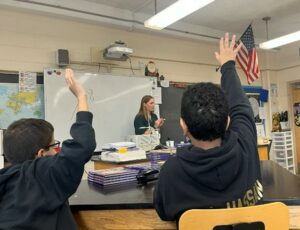PD Workshops will take place at your site- they can include faculty at your site or specific grade levels and subject staff from your district. Participants will experience place-based, locally relevant, and hands-on experiential activities. GSWA staff will provide highly vetted, science-based resources across all subject areas. GSWA will demonstrate lessons and interactive models and leave participants with the resources needed to turnkey these resources in their classrooms.
Workshops are:
- Geared toward grades 5–12, cross-curricular
- Customizable to your curriculum, school-specific units/projects and site
- Underwritten by the CCLC grant
- Capacity: 10–30 participants
- Duration: 3 hours (AM, PM, or post early-dismissal days)
- Can be scheduled to meet your availability/space
Priority given to CCLC grant recipient districts
Programs are:
- Taught by Master Ecologists and scientists who understand these issues
- Involve hands-on, place-based learning to engage in real world issues and solutions
- Focus on how climate education can be taught effectively across the school curriculum
- Focus on how climate change impacts affect New Jersey
- Link to the NGSS Climate standard bands
- Are solutions-focused and based on high quality science, research, and data
- Leave educators with turnkey-ready resources for implementing lessons into classrooms
To book an on-site PD training, please reach out to Alex Sloane at asloane@greatswamp.org
 Anyone living in New Jersey is likely already directly experiencing the impacts of climate change, such as more severe storms and flooding, which impact on our communities and homes. New Jersey educators are at the forefront shaping learners’ understanding of this complex and contentious issue and improving student ability to engage and stay resilient dealing with climate change.
Anyone living in New Jersey is likely already directly experiencing the impacts of climate change, such as more severe storms and flooding, which impact on our communities and homes. New Jersey educators are at the forefront shaping learners’ understanding of this complex and contentious issue and improving student ability to engage and stay resilient dealing with climate change.